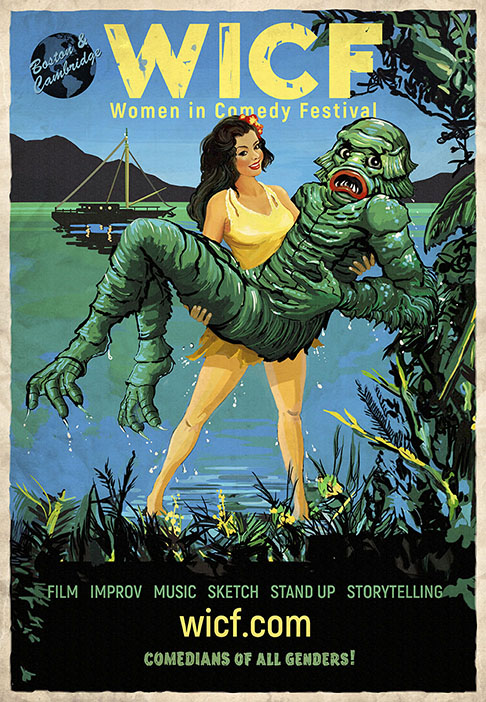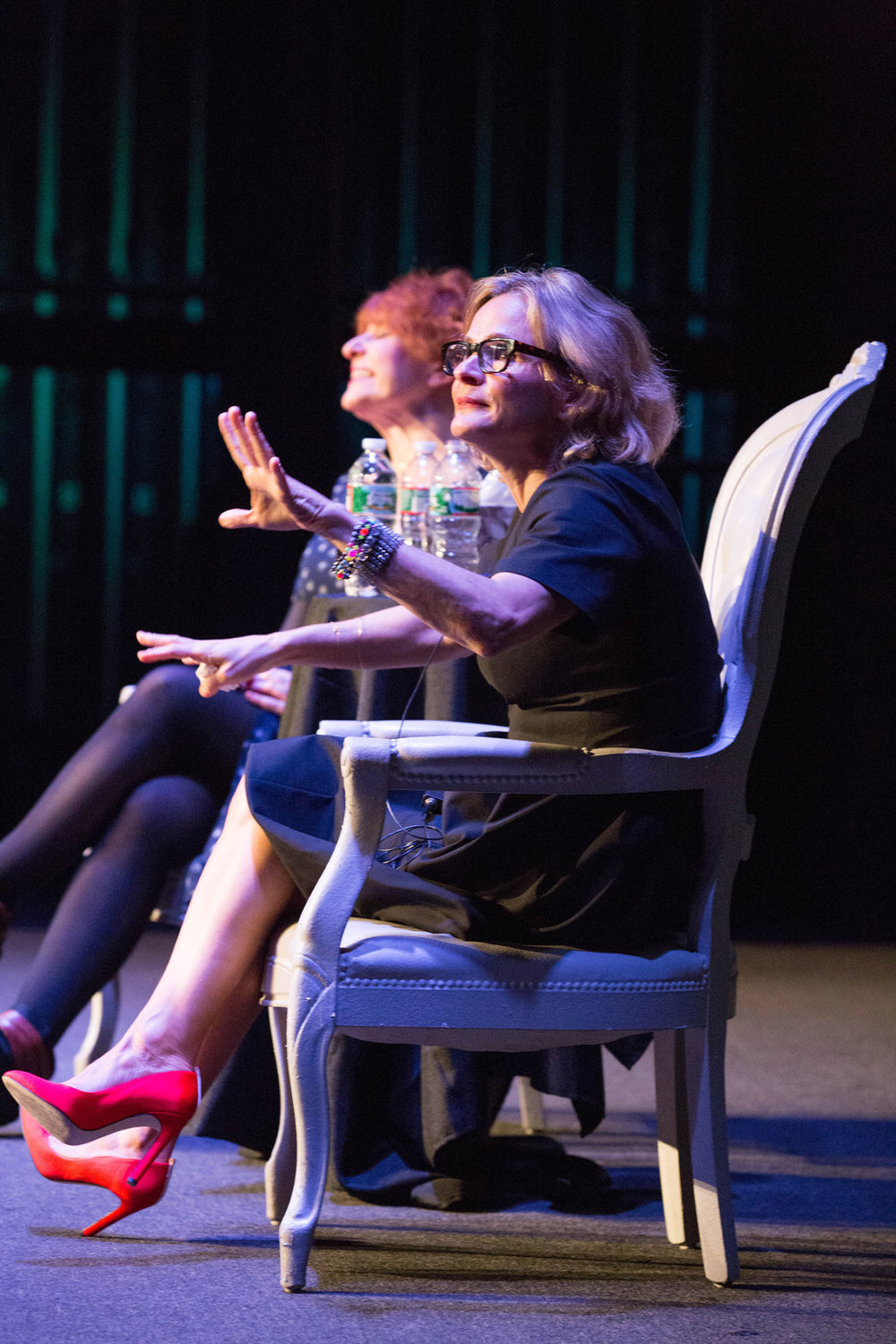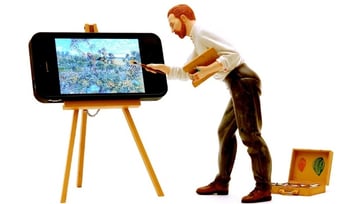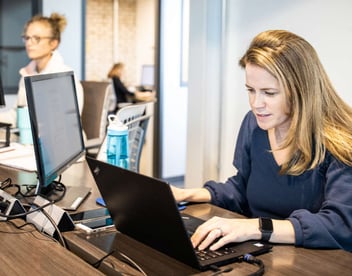The Disruptive Laughter of the Women in Comedy Festival
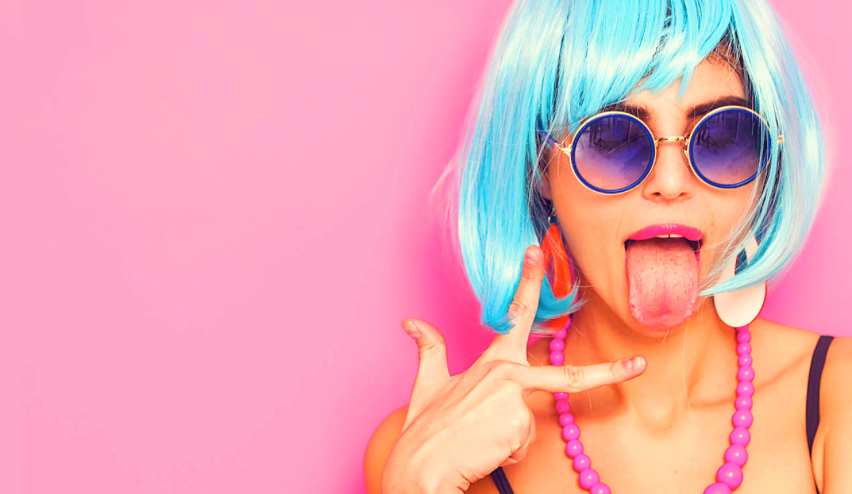
“Laughter is the shortest distance between two people.” Michelle Barbera quotes Victor Borge at the end of our conversation about comedy, coworking, culture, and her Women in Comedy Festival. The Boston-based comedienne has headquartered operations for her April festival in Workbar Cambridge, and it becomes quickly obvious that what she is doing with comedy is working towards something more than a punch line.
But first we discuss the gender gap: “As if anyone doubted that there was a need for a festival celebrating women in comedy, just look at the Ghostbuster’s reboot.”
She describes the crazy backlash against the recent sequel, and points out how the online troll-driven momentum against it resulted in it having the most negatively reviewed trailer in YouTube history. “It wasn’t a dismissal of women as unfunny. It was more like ‘You’re ruining my childhood!’”
Before she pulls up the statistics proving that women are woefully underrepresented at every single level of show business, she talks about the bigger picture. “Part of comedy is being vulnerable, open and real. This is a huge problem in business, science, and any areas that are still male-dominated.”
She has seen the same pattern over and over since her start in 2001. “Comedy lineups had seven or eight men, and no women. I got sick of that- it was demoralizing. Then if there’s only one woman on the show and she doesn’t knock it out of the park, all women get a bad rap.”
With such an unbalanced playing field and lack of community, she realized she needed to start her own festival. She worked with fellow comedians Maria Ciampa and Elyse Schuerman to hold the first one in 2009 at Improv Boston, with Kelly MacFarland as her first headliner. The mostly female cast was not (and is not) averse to male comedians whatsoever, and embraces talents like Josh Gondelman- who now writes for John Oliver- and full time Operations Deputy Josh Brosnan, who works out of Workbar Cambridge with her. Over the years, other headliners have included Maria Bamford, Jane Lynch, Wendy Liebman, Rachel Dratch, Kristen Schaal, Jen Kirkman, Morgan Murphy, Horatio Sanz, Kevin Allison, Ilana Glazer, Sasheer Zamata, Amy Sedaris and Jackie Kashian.
She tells me about the festival launch coming up on October 25th at the OBERON with special guest Faith Soloway of the hit show Transparent, and several other stars from Broad City, Just for Laughs, Comedy Central, and Colorstruck.
Barbera is extremely busy these days, and I wondered how much the current political climate fed into the demand for comedy, like a remedy.
“I think people always think there’s fear and doubt. Two thousand years ago it was the same. Statistically, the world is safer now, but what’s driving us is constant, immediate info. Negative stuff gets spread the most: scandals, bombings, shootings… Trump is a terrible offender, climate change is depressing, but it’s also what gives comedians opportunity.”
If you've ever wondered why comedy is lopsidedly liberal, she says that comedy only works when you’re telling the emperor he has no clothes. It doesn’t work when you kick a peasant in the stomach. “Comedy is disruptive, so if you’re on the side of the reactionary, then how is that subversive?”
Barbera tells me that she knew she was seizing upon a kind of “cultural zeitgeist”, and became unstoppable. “This was two weeks after the birth of my first child, so I was in the hospital, awaiting delivery, working on my laptop to get the festival ready. And I had my fourth right before another festival, and wore the baby to it!” She doesn't say anything about The Patriarchy, but I can hear it crumble a little at this recollection.
She denies the notion that the comedy scene in Boston might become saturated, suggesting instead that the more comedy that comes from here, the better. “These are exciting times for comedy in Boston. The scene is booming! In the 70s and 80s, we had very successful comedians like Jay Leno, Stephen Wright, Louis C.K, and Dennis Leary come out of the Boston scene. Back then, things were different, so everyone's path was relatively straightforward: you had a five minute standup bit- your “tight five”- and you tried to get on the Tonight Show. Now it’s very spread out and you can get to people through different platforms. We want to keep the boom going, because we’re not going to exhaust all the outlets.”
She describes a kind of cross-pollination between the genres of comedy that might have competed for attention in the past. “In the ‘80s, standup and improv were opposed. Now, they aren’t at all. Sketch is very important because if you can write sketch comedy, you can write for a sitcom, you can write for comedy shows… It has changed so much that Emerson College even has a comedy major.”
You're joking.
“Oh yeah. In fact, those students are a great audience at our shows.”
Her goal is to broaden the Women in Comedy Festival into a wider experience, to take it from a single live event to comedy writing, podcast, video, and film experience. “We are launching two comedy sites with daily reviews, recaps, editorials, news, and a new publication called Jelly.” She outlines some of the interconnected players in her comedy scene, from the Boston Comedy Chicks to the showcases in Doyles Café to the open mics and workshops around town. “You’re never done as a working comedian. In fact, it’s a lot like Workbar, where you have interns and CEOs influencing each other.”
Despite our screen-obsessed culture, discussing the future of comedy with Barbera is an affirmation of our own humanity. “It’s like in Workbar where you just need to get in the same room to figure things out. In comedy you need a relationship with your audience. That relationship is a very powerful, shared experience. Even if it’s taped, no one will ever be on the inside with them who wasn’t there in the moment. You can’t ever replicate it.”
Then she tells me her dream of some day bringing kids from diverse cultures together to practice improvisational comedy, shortening the distance between people with laughter.
Dave Gentry is a fan of progress and recess. He believes in Olde English, new fortune cookies, and he answers to #davertido.
About Workbar:
Workbar operates coworking locations throughout greater Boston (Boston Back Bay, Boston South Station, Burlington, Cambridge, Arlington, Brighton, Danvers, Norwood, Salem) and several other partner locations throughout the state. Want to keep up with the world of Workbar? Subscribe to our mailing list for the most up-to-date information about our upcoming events and community news. You can also follow us on Instagram, Facebook, LinkedIn and Twitter.
